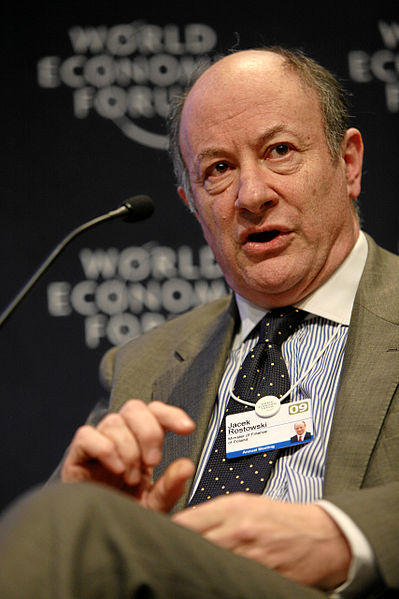For some years, we have had some contact with cautionary thresholds written down far-sightedly in acts and even the constitution. In the time of crisis they have been something to pride ourselves on. Today the government suggests “suspending them for just one time”. However, we realise that “just one time” means “forever”. It is enough to recall the “temporarily” introduced Belka’s tax, or the VAT also increased “for some time” only. The government does not notice that it is dismantling a dam which protects us from a spending spree – if cautionary thresholds can be suspended this time, then why not a second, a third or a fourth time.

DAVOS-KLOSTERS/SWITZERLAND, 28JAN09 - Jacek Rostowski, Minister of Finance of Poland, captured during the session 'Update 2009: Europe' at the Annual Meeting 2009 of the World Economic Forum in Davos, Switzerland, January 28, 2009.
Finance Minister Rostowski claims that “the liquidation of the Open Pension Fund is not completely ruled out”. But he is far from being right. The liquidation of the Open Pension Fund is completely certain. But we still do not know if it will happen during this or the next “review” of the pension system, because all these “reviews” lead to the dismantling of this system. It is easy to notice because no single conclusion from the last review came into force; the only thing that happened was cutting down pension premiums.
Our public finances are permanently unbalanced and what is worse, this gap between incomes and expenses will get wider. No political power is interested in changing this state of affairs, and it is difficult to imagine Leszek Balcerowcz with his Civil Development Forum gaining the majority of seats in Parliament. There will be no reform because it would disrupt the subtle balance maintained by buying social peace from organised and influential social groups such as miners, teachers, administration etc. for private sector’s money. No politician will commit that kind of suicide.
But we can see how huge a burden this situation is becoming. Every crisis, even a small one, causes an avalanche of debts and, we have had some contact with cautionary thresholds written down far-sightedly in acts and even the constitution. In the time of crisis they have been something to pride ourselves on. Today the government suggests “suspending them for just one time”. However, we realise that “just one time” means “forever”. It is enough to recall the “temporarily” introduced Belka’s tax, or the VAT also increased “for some time” only. The government does not notice that it is dismantling a dam which protects us from a spending spree – if cautionary thresholds can be suspended this time, then why not a second, a third or a fourth time… The goal is to protect the expenses, which is easy to notice after the draft amendment of the budget consisting mainly in the increase of the deficit.
All these things happen when our country is doing quite well. Demographic catastrophe will hit with its whole strength in about 10 years; we still have economic growth. All the good things are behind us and we can prepare ourselves for a hard landing. That is why sacks with money in the Open Pension Fund and Demographic Reserve Fund will not be left in peace by the government. If it were to be an election gimmick, then let it be. The orchestra will be playing till we are able to pretend that the present situation can be maintained.
But it has to come to an end because the fight with mathematics is doomed in the long run. The deficits of the Social Insurance Fund can destroy every budget, especially without the cover in the Demographic Reserve Fund. At the same time, the dismantling of the Open Pension Fund means increasing deficits only to save the present budget, which operates in a relatively good situation. It is like saving money for a rainy day, tightening one’s belt when the situation is good, borrowing money in good times to pay off debts in difficult times. From a sensible person’s point of view it is a completely ridiculous action, but from a politician’s point of view paying off debts will have to take place when he or she stops being in power and meanwhile there is another election soon. But it is the point of view which distinguishes a politician from a statesman.
It means that in some years we will have big liabilities – mainly connected with pensions – and no assets. For sure, in such a situation we would go bankrupt and e.g. the idea of a civil pension would be created. Many privileges would have to be reduced and it could cause great protests. If we call it “the Greek variant”, then we have quite an optimistic perspective. In 10 or 15 years Germany will also find themselves in a difficult situation and we can be quite sure that they will not give Poland billions of dollars to slightly mitigate the shock, like in the present case of Ellada. It is difficult to predict what will appear when the dust settles. Let’s hope that our country is ready to abandon crazy ideas and build its future on the fundaments of freedom – also economic one. Unfortunately, it is much more probable that again liberals will be burdened with the responsibility for the catastrophe of interventionism. Then we can fall into a spiral of populism, which leads to a much bigger poverty. This is unfortunately a much more probable scenario.
Translation: Anita Stradomska


















No comments
Be the first one to leave a comment.